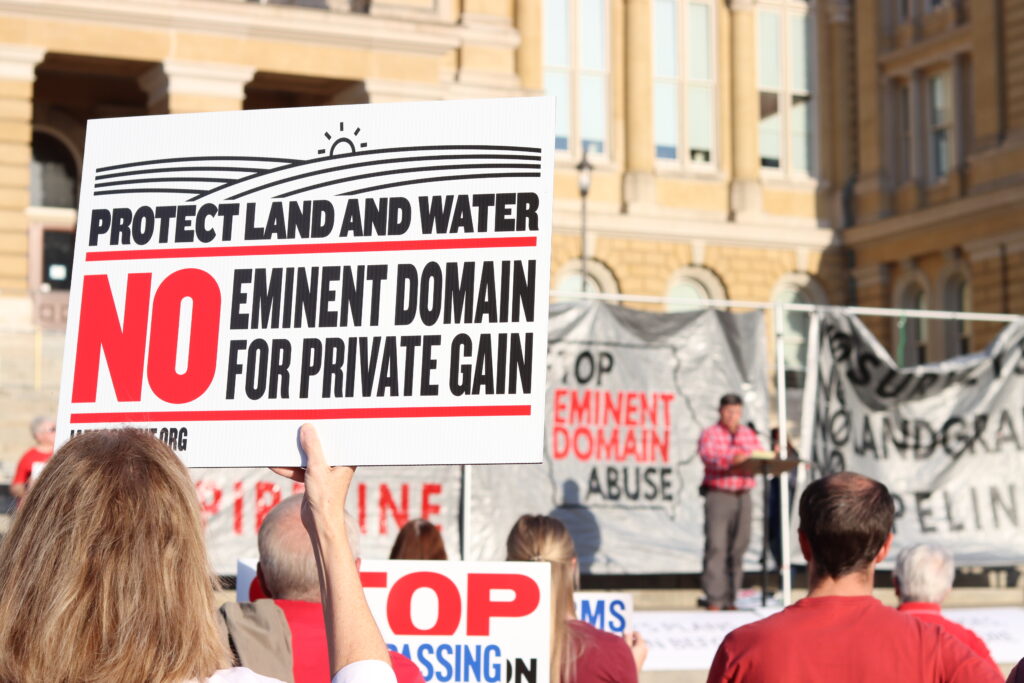On October 8, 2023, nearly 80 protesters gathered outside the Iowa Capitol to voice their discontent over the Summit Carbon pipeline, prior to a critical Supreme Court hearing. The legal dispute centers around the constitutionality of an Iowa law that permits pipeline companies to survey land without the landowner’s consent. During the hearing, attorney Brian Jorde, representing Hardin County landowner Kent Kasischke, emphasized the ethical implications of allowing for-profit companies to intrude on private property, questioning whether the judiciary would truly grasp the situation’s gravity. The proceedings were heavily attended, with the Iowa Supreme Courtroom full to capacity, spilling over into adjacent rooms.
The podium issue began when the Hardin County district court ruled in favor of Summit Carbon Solutions, asserting that Kasischke could not obstruct the company’s survey plans for a pipeline intended to transport carbon dioxide from ethanol facilities to underground storage in North Dakota. Kasischke is contesting this ruling based on the argument that it is unconstitutional for a company lacking eminent domain status to conduct pre-survey activities on private land. Jorde likened such actions to unwarranted intrusions into personal spaces, further supporting his claim by asserting that a company without the authority to condemn property should not have access for survey purposes.
The Iowa Utilities Commission granted a permit to Summit Carbon in August 2023, enabling the company to pursue eminent domain for the project, which encompasses nearly 700 miles of pipeline across Iowa. Jorde argued that allowing surveys under these conditions sets a dangerous precedent for landowner rights, noting that it conflicts with the principle of needing proper condemnation authority before proceeding with such invasive actions. He urged the justices to find Iowa Code 479B.15 unconstitutional or to limit its scope to less invasive survey methods, drawing on a similar ruling made by the South Dakota Supreme Court.
In response, Ryan Koopmans, representing Summit Carbon, argued that for the statute to be deemed unconstitutional, it would have to violate rights across all potential applications. He expanded on the implications of invalidating the statute, asserting that it would create significant barriers for other regulatory entities, including the Iowa Department of Transportation, railroads, and electric utilities that also require access for surveying. His position highlighted that without legislative support, surveying land for proposed projects would necessitate a comprehensive condemnation process. Koopmans sought to uphold the district court’s ruling, asserting an injunction was justified based on the landowner’s objections and previous court decisions.
The case marks a pivotal moment, as it brings to light various competing factors surrounding landowner rights and the needs of public and private infrastructure projects. The dynamic between protecting individual property rights and enabling development initiatives creates a complex legal landscape. Cases like Kasischke’s contrast with the earlier Clay County ruling in May 2023, where the court sided with landowners against pipeline surveying without compensation for intangible damages. Legal precedents being established may play a significant role in shaping future interactions between pipeline companies and landowners.
As the legal proceedings unfolded, industry opposition was galvanized, leading to sustained activism on the ground. Pipeline critics, including Ed Fischbach, spoke out against Summit Carbon’s efforts, drawing parallels to Navigator CO2 Ventures’ abandoned pipeline operations. Fischbach’s message echoed a broader sentiment among landholders resisting corporate endeavors perceived as encroachments on personal rights. The Iowa Supreme Court is expected to deliver a ruling on this contentious matter by the end of its term in June 2024, but anticipation builds for an earlier decision as the implications for property rights and pipeline regulation remain at the forefront of stakeholders’ concerns.

